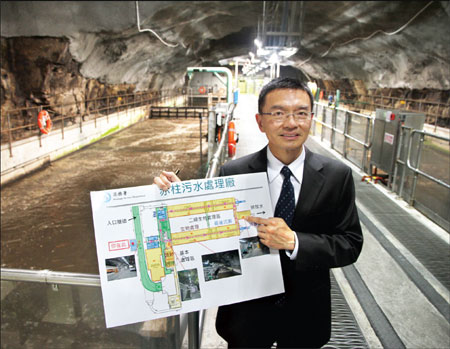Hong Kong's Drainage Services Department is researching the feasibility of relocating the Sha Tin Sewage Treatment Works to mountain caverns to free about 28 hectares for housing and other uses on the existing site. The study is expected to be finished by the middle of 2014. The relocation site initially was proposed as Nui Po Shan, Sha Tin.
Lai Cheuk-ho, chief engineer of sewage projects, said, "Relocating the sewage treatment works to a cavern could develop new land resources and balance development, considering community needs. It can also reduce the impact on the surrounding landscape." He added, the department will explore upgrading sewage treatment facilities and adopt an advanced sewage treatment system.
|
 Drainage Services Department Chief Engineer Lo Kin-hung briefs media about cavern sewage treatment works in the city's first such facility in Stanley. The department is looking into a plan to move Sha Tin Sewage Treatment Works to a cavern to free 28 hectares of land. [Photo/China Daily] |
In the 2012-13 budget, the government said it will continue to increase land supply and has started public engagement exercises to plan for new development areas, including a proposal to develop caverns, in the long-term interest of Hong Kong. The project was allocated HK$300 million ($38.7 million).
The detailed engineering feasibility study includes preliminary technical and impact assessments, preparation of outline design for the engineering works and formulation of implementation strategies and programs.
The department would investigate further treatment of a portion of treated effluent to reclaim water for other uses such as toilet flushing and controlled irrigation.
The existing Sha Tin Sewage Treatment Works covers an area of 28 hectares and was commissioned in 1982. The service area includes Sha Tin and Ma On Shan, covering about 630,000 people.
The relocation is part of a long term plan for the current aging Sha Tin Sewage Treatment Works. The system requires maintenance and updating to a higher scale. The department's focus of its work will be how to move the current project to the new location.
It will also carry out studies to reconfirm the proposed relocation site for the Sha Tin Sewage Treatment Works. Additionally, it will collect relevant overseas information about sewage treatment and cavern construction technologies. Staff has already visited similar facilities in the Nordic countries, which have extensive experience in cavern sewage treatment works.
The project is estimated to cost HK$10 billion, but the final cost will depend on the size of cavern development and the adopted technology. The first stage of public engagement runs from November to next February.
The plan already has the support of the Sha Tin District Council, said the department.
The Stanley sewage treatment works was the first sewage treatment facility located in a cavern in Hong Kong. It was commissioned in 1995, built underground and housed inside three large caverns.
The service scope of the Stanley sewage treatment works covers Stanley, Tai Tam, Chung Hom Kok and Red Hill, serving about 27,000 people.
fanfeifei@chinadailyhk.com
